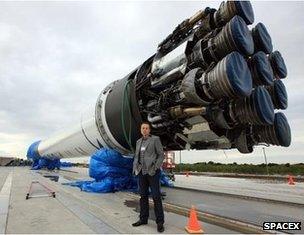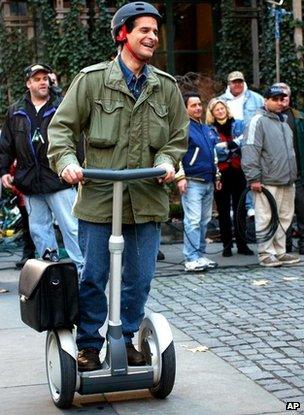Elon Musk to outline 'Hyperloop' idea
- Published

Elon Musk has already developed a new rocket system for the US space agency
US entrepreneur Elon Musk is expected to give more details later of his supersonic "Hyperloop" concept to link Los Angeles and San Francisco.
The SpaceX, external and Tesla, external founder has teased audiences with titbits of information about the rapid transit idea, which he claims could make the 380-mile (610km) journey in "about half an hour".
It seems to involve sending passengers through a tube in capsules.
Mr Musk says Hyperloop could be built for less than a conventional rail link.
The current proposed 130mph (210km/h) high-speed train connection between LA and San Francisco is unnecessarily expensive and underwhelming in ambition, he has complained.
"I originally started thinking about [Hyperloop] when I read about California's high-speed rail project which was somewhat disappointing," he told a Google Hangout with Richard Branson last week.
"It's actually worse than taking the plane. I get a little sad when things are not getting better in the future.
"Another example would be like the Concorde being retired and the fact there is no supersonic passenger transport. I think that is sad. You want the future to be better than the past, or at least I do."
Mr Musk claims Hyperloop would be a practical solution for city pairs separated by 1,000 miles (1,600km) or less. Beyond this distance, it would be better to take a plane, he explained.
But for the shorter distance, his new concept would beat the plane, he argues, because it would not waste time ascending and descending.
"It does involve a tube but not a vacuum tube… not frictionless but very low friction," is all he will add.
Tube system
The speculation is that Mr Musk is thinking of some kind of "rail gun". This would see passengers sit in cars that were then fired down a tube which had had most of its air removed. A system of magnets would accelerate and brake the capsules, and also keep them from touching the sides of the tube.
"You want a transport system that is roughly twice as fast as the next best alternative, that costs less, that is safer, that is not subject to weather and is more convenient," Mr Musk said.
"If there were such a thing, I think most people would take it. In fact, it would increase the travel between the city pairs because of the increased convenience."

The hype is reminiscent of the pre-launch publicity for the Segway
Whatever Mr Musk proposes, people are sure to sit up and take notice.
The entrepreneur made his fortune with the internet payment system PayPal before switching his skills into developing the new Falcon rocket system for Nasa and the Tesla electric car. He is also a big investor in solar energy in California.
"[Hyperloop] is quite an old science fiction idea but Elon Musk is the sort of man who could make it work," commented physicist Martin Archer from Imperial College London, UK
"He's the guy who made electric cars go fast with Tesla, which many people didn't think would be possible; and he's the head of SpaceX which is the only commercial rocket builder that has managed to hook up with the International Space Station."
The pre-announcement hype that surrounds Hyperloop is reminiscent of the speculation that ran ahead of the unveiling of the Segway scooter in 2001.
Back then, the media was full of stories about a project that could "revolutionise personal transportation". The two-wheeled, self-balancing device was certainly innovative and found an eager market, but it has remained a niche product.
Mr Musk says he is so busy with SpaceX and Tesla that he will not immediately try to develop Hyperloop himself. Only if no-one else picks up the challenge will he consider attempting to make it a reality at a later time.
Jonathan.Amos-INTERNET@bbc.co.uk and follow me on Twitter: @BBCAmos, external
- Published9 May 2013
- Published31 May 2012